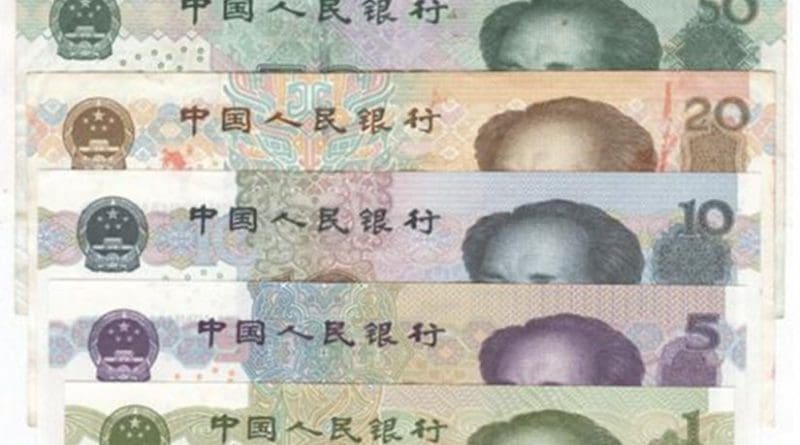China Arrests Hundreds Following Stock Market Dive
By RFA
Chinese police have arrested hundreds of people including top securities officials and a financial journalist in a nationwide operation linked to the recent meltdown on the country’s stock market, official media reported.
Top financial journalist Wang Xiaolu appeared on state broadcaster CCTV on Monday, “confessing” to spreading false market information.
Wang, who writes for the widely respected financial magazine Caijing, has been placed under “coercive measures” on suspicion of “fabricating and spreading fake information on securities and futures market,” the state-run news agency Xinhua reported.
Wang, who was arrested at his Beijing home on Aug. 25, said he wrote an article “based on hearsay and my own subjective guesses without conducting due verifications.”
“This false information caused panic and disorder in the stock market, seriously undermined market confidence, and inflicted huge losses on the country and on investors,” he said.
Wang’s article, which appeared in Caijing on July 20, said that the China Securities Regulatory Commission (CSRC) was considering ending interventions aimed at stabilizing share prices.
The CSRC blamed the piece for a July 27 sell-off on the Shanghai stock market, which came before the market crash this month, press freedom group Reporters San Frontieres (RSF) said.
Police are also holding CSRC official Liu Shufan under “coercive measures” on suspicion of “insider dealing, taking bribes and forging official seals,” Xinhua said.
Liu “took advantage of his position to secure an approval from the securities authorities for a public company and help the growth of the company’s shares,” receiving bribes of several million yuan in return, and had made several million yuan from insider dealing, it said.
Citic Securities executives Xu Gang, Liu Wei, Fang Qingli and Chen Rongjie are also being held under “coercive measures” on suspicion of insider trading, Xinhua said, adding that they had also “confessed.”
“Coercive measures” can refer to arrest, detention, compulsory summons for questioning, police bail, or residential surveillance and house arrest.
Netizens targeted
Meanwhile, 197 people have been rounded up in a special campaign targeting online rumors, which included tweets and messages about China’s stock market, as well as recent fatal explosions in Tianjin, Beijing’s ministry of public security said in a statement on its website.
“Police across China have launched an operation targeting rumor-mongering on the Internet, on microblogs and on WeChat, and have netted 197 criminals suspected of illegal rumor-mongering,” the statement said.
“The criminal suspects who were discovered have expressed deep repentance over their online rumor-mongering activities, which created a mood of terror, misled society and the public, and caused serious disturbance to the orderly operation of financial markets and to public order,” the statement said.
“They have called on Internet users to heed this lesson, and to abide by the law.”
It said a total of 165 websites and online accounts had been closed down in the operation.
Call for release
Paris-based RSF called for Wang’s immediate release.
“Suggesting that a business journalist was responsible for the spectacular fall in share prices is a denial of reality,” RSF secretary-general Christophe Deloire said in a statement on the group’s website.
“Blaming the stock market crisis on a lone reporter is beyond absurd,” he said.
“We call for Wang Xiaolu’s immediate release without any charges being brought against this Caijing reporter,” Deloire said.
Xie Jiaye, head of the New York-based Chinese Association of Science and Technology U.S.A., said China’s tightly controlled state media had been unable to report accurate information on market movements, because it had been ordered to support the government’s attempts at market intervention.
“The Chinese media has been talking up the government’s market intervention measures, and so-called malicious short-selling,” Xie said.
“But that is ridiculous, because the government shouldn’t be intervening in the market,” he said. “Markets follow their own natural laws, and they won’t do what the Communist Party tells them to do.”
Censoring market coverage
According to RSF, the ruling Chinese Communist Party has “gone to great lengths” to censor media and online coverage of recent turmoil on the country’s stock markets.
Leading Communist Party-controlled media outlets like the People’s Daily, Xinhua and CCTV have given scant coverage to the story, while the propaganda ministry has issued directives forbidding articles or market analysis deemed to be negative, it said.
According to Xinhua, “investigations into the case are still ongoing.”
On Sept. 1, 2013, China’s highest judicial authorities issued a directive criminalizing online “rumor-mongering” in a move widely seen as targeting critical comments and negative news on the country’s hugely popular social media sites.
Reported by Gao Shan for RFA’s Mandarin Service. Translated and written in English by Luisetta Mudie.

